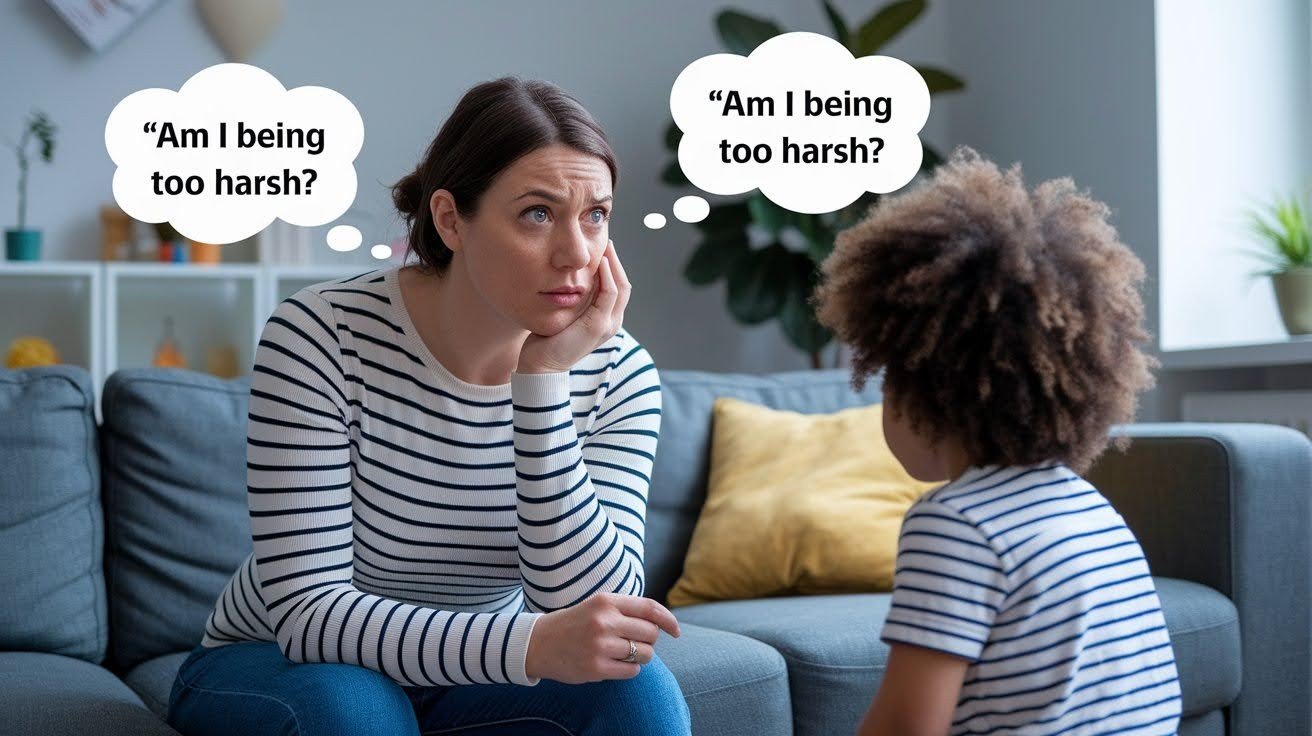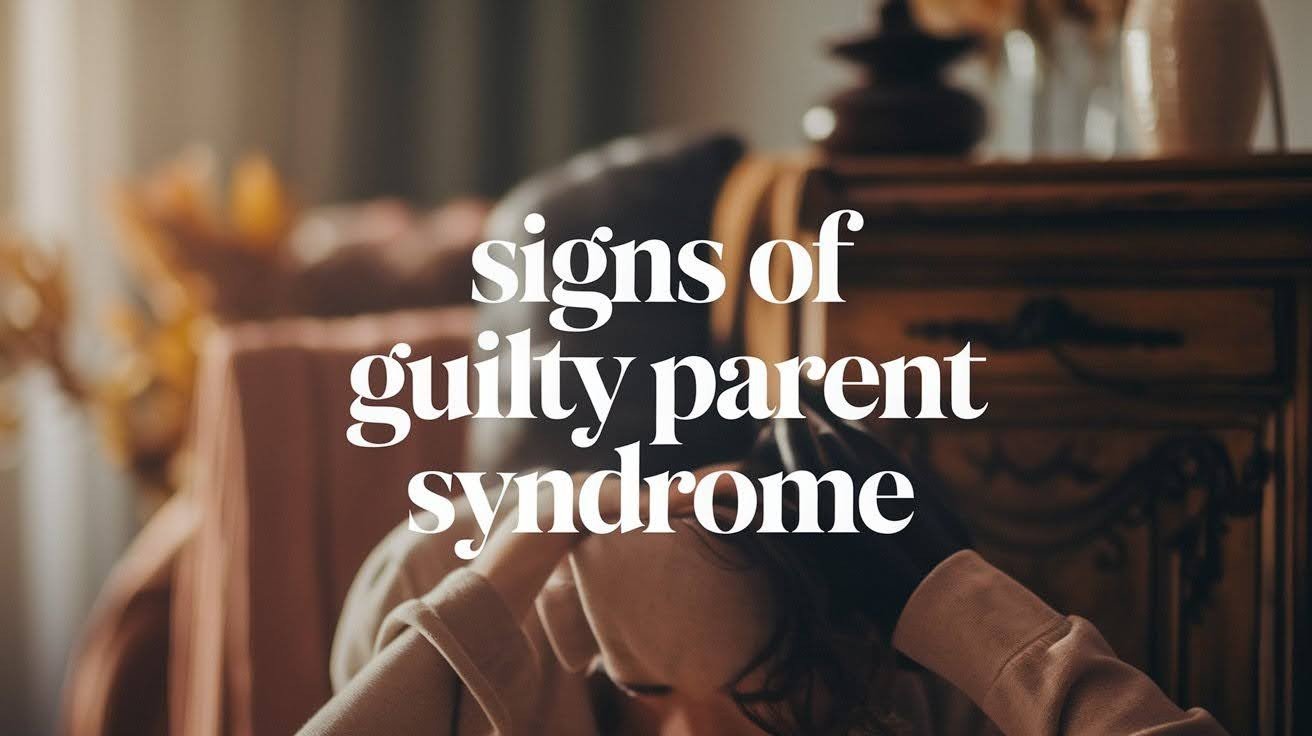Did I lose my patience too quickly today”? If these thoughts cross your mind as you tuck your child into bed, when you’re far from alone. Many parents wrestle with these feelings and negative thoughts, replaying moments, and question whether.
How parents know this feelings all too well, its that intense self doubt that creeps is no matter what how much love and support to you and your pour into the family. Some call it “guilty parent down syndrome”The first step to easing this pressure is simplify noticing it reconagize these moments for what they are, remind yourself that parenting isn’t about pressene, love and caring step that she loves you.
What is Guilty Parent Syndrome?
Guilty Parent Syndrome is when parents constantly doubt their decisions and feel they are falling short, even when they are loving and attentive. It’s the nagging sense that they should always do more, be more patient, or handle every situation perfectly.
This mindset can lead to persistent stress, self-criticism, and anxiety. Over time, it can affect both the parents’ well-being and their relationship with their child, making it important to recognize and address these feelings early.
Understanding Parental Guilt vs. Normal Parenting Concerns
There’s a big difference between healthy self-reflection and harmful self-blame. Normal parenting concerns help you grow and make better choices. They come and go naturally as you learn.
Guilty parent syndrome goes much deeper. It’s self-doubt wrapped in love, creating a constant feeling that you’re not good enough. You carry an invisible checklist that never seems complete, no matter how hard you try.
This type of guilt doesn’t motivate positive change. Instead, it creates a cycle of shame that makes parenting feel overwhelming and joyless.
Common Thoughts That Signal Guilty Parent Syndrome
Parents experiencing this syndrome often have similar thoughts running through their minds. These thoughts become a broken record of self-criticism.
“I should have been more patient” becomes a daily refrain after normal parent-child interactions. “They deserve better than this” follows small mistakes that all parents make. “I’m not cut out for this” creeps in during challenging moments.
The most painful thought is often “I’m failing them.” This belief can take root despite clear evidence of love, care, and effort. These signs of guilty parent syndrome show up when parents judge themselves more harshly than they would judge any friend or family member.
Key Signs of Guilty Parent Syndrome
These 11 key signs can help you recognize guilty parent syndrome and understand how it may be affecting your thoughts, feelings, and relationship with your child:
Constant second-guessing of parenting decisions

Constantly second-guessing your parenting decisions is a common sign of guilty parent syndrome. You might replay situations in your mind, wondering if you handled them the “right” way.
This self-doubt can make even small choices feel overwhelming, from discipline to daily routines, leaving you feeling unsure and anxious.
Over time, this habit can erode confidence in your instincts. Recognizing it is the first step toward trusting yourself and making decisions with more ease and clarity.
Feeling like a bad parent more often than a good one

You love your child deeply, yet you often catch yourself thinking, “Am I failing them?” Feeling like a bad parent more than a good one is a common sign of guilty parent syndrome.
These thoughts can overshadow all the small, meaningful things you do daily: making bedtime hugs, helping with homework, or simply being present, feel like they don’t “count enough.”
It’s important to remember that your love and effort matter far more than perfection. Recognizing these feelings helps you shift focus from self-criticism to celebrating the parenting wins you already achieve.
Replaying past mistakes over and over

Do you find yourself replaying past parenting moments over and over, wishing you had done something differently? This is a classic sign of guilty parent syndrome.
Your mind fixates on mistakes, big or small, making it hard to enjoy the present with your child. Each replay can heighten stress and self-doubt.
Remind yourself that no parent is perfect. Acknowledging past missteps without dwelling on them allows you to learn, grow, and focus on the loving moments you create every day.
Feeling shame after reacting emotionally

After raising your voice or reacting emotionally, you might feel a wave of shame wash over you. This is a common experience for parents struggling with guilty parent syndrome.
These moments can make you dwell on being “too harsh” or “not good enough,” even if your reactions were natural and human.
It helps to remind yourself that emotional responses don’t define your parenting. Acknowledging your feelings, apologizing if needed, and moving forward teaches both you and your child about growth and emotional resilience.
Apologizing excessively for small things

Do you find yourself constantly saying sorry for even minor parenting moments? Excessive apologizing is a key sign of guilty parent syndrome.
This habit often comes from feeling like you’re falling short, even when your actions are reasonable and loving.
Remember, apologizing is healthy when needed, but overdoing it can undermine your confidence. Trust your instincts and balance accountability with self-compassion to model healthy behavior for your child.
Trying to “make up for it” with gifts or treats

After feeling guilty about a parenting mistake, you might try to “make up for it” with gifts or treats. This is a common sign of guilty parent syndrome.
While giving is loving, using it to soothe your guilt can create a cycle where you rely on material things instead of connection and communication.
Focus on spending quality time, showing understanding, and having honest conversations. These moments build stronger bonds and help both you and your child feel valued beyond any gift.
Avoiding setting boundaries due to fear of being “mean”

You might hesitate to set rules or boundaries because you fear being seen as “mean” or “harsh.” This is a common sign of guilty parent syndrome.
Avoiding boundaries can lead to inconsistent discipline and leave both you and your child feeling frustrated or confused.
Remember, setting clear limits is an act of love. Healthy boundaries teach children respect, responsibility, and security while helping you parent with confidence and peace of mind.
Ignoring your own needs to keep your child happy

You may put your child’s needs above your own so often that your own well-being takes a backseat. This is a common sign of guilty parent syndrome.
Constantly ignoring yourself can lead to exhaustion, stress, and resentment, even if your intentions are loving.
Taking care of yourself isn’t selfish it models self-respect and balance. Meeting your own needs helps you stay patient, present, and emotionally available for your child.
Comparing yourself constantly to other parents

You might catch yourself thinking, “Why can’t I be like that parent?” Constantly comparing yourself to others is a clear sign of guilty parent syndrome.
These comparisons often overlook your unique strengths and the love you consistently show your child, making you feel unfairly “less than.”
Shifting focus to your own journey and celebrating small wins nurtures confidence, reduces guilt, and helps you parent in a way that truly fits your family.
Seeking emotional support from your child

Sometimes, you may find yourself leaning on your child for comfort or reassurance. Seeking emotional support from your child is a common sign of guilty parent syndrome.
This can blur the parent-child roles, making your child feel responsible for your emotions rather than feeling safe and cared for.
Instead, seek support from friends, family, or professionals. Taking care of your emotional needs helps you stay present and nurturing for your child while modeling healthy coping.
Trying to be perfect at everything

You might feel pressure to handle every aspect of parenting flawlessly. Trying to be perfect at everything is a common sign of guilty parent syndrome.
This perfectionism can lead to constant stress, self-criticism, and the fear that any mistake makes you a “bad parent.”
Accepting that imperfection is natural allows you to focus on love, effort, and connection. Embracing mistakes as learning opportunities models resilience for your child and eases your own guilt.
Who Experiences Guilty Parent Syndrome the Most?
These signs of guilty parent syndrome don’t affect all parents equally certain groups face higher risks:
High-Risk Groups
Working parents struggle with time guilt more than others. Research shows 57% of working mothers and 37% of working fathers feel they don’t spend enough time with their children.
Single parents face extra challenges. Chronic stress and financial pressure can make normal parenting mistakes feel much bigger than they are.
Parents with mental health challenges often experience these symptoms more intensely. Depression and anxiety can make guilty thoughts feel more real and harder to shake.
Studies show mothers report higher levels of parenting stress and guilt compared to fathers. Social expectations often place more pressure on mothers to be perfect caregivers.
Societal and Cultural Factors
Social media makes comparing yourself to other families too easy. Perfect family photos don’t show the real struggles behind them.
Traditional gender roles still influence expectations. Many mothers feel pressure to be naturally nurturing and patient all the time.
Our culture promotes “perfect parenting” myths. This pressure makes normal human mistakes feel like major failures, feeding into guilty parent syndrome symptoms.
Understanding the Impact: When Guilt Helps vs. Hurts
Understanding the Impact: When Guilt Helps vs. Hurts Find out how guilt can either motivate positive change or weigh down your well-being, depending on how it’s managed:
| Helpful Guilt | Harmful Guilt |
| Motivates positive change | Creates paralysis and fear |
| Leads to learning and growth | Causes endless self-blame |
| Focuses on specific actions | Attacks overall worth as a parent |
| Temporary and productive | Persistent and destructive |
| Results in better choices | Results in anxiety and doubt |
Helpful guilt serves a purpose. It shows up when you need to adjust your approach or make amends for real mistakes. This type of guilt leads to reflection and positive change.
Harmful guilt becomes a constant companion. It makes you question everything and creates more problems than it solves. These signs of guilty parent syndrome hurt both you and your family.
Root Causes Behind Guilty Parent Syndrome
Guilty Parent Syndrome often stems from deep-seated pressures and expectations. Understanding the root causes, such as perfectionism, societal pressures, past experiences, or unrealistic self-expectations:
- Perfectionism and unrealistic expectations: Setting impossible standards for yourself as a parent
- Past parenting experiences and generational patterns: Carrying forward negative experiences from your own childhood
- Personal mental health and stress levels: Depression, anxiety, or high stress, making normal challenges feel overwhelming
- Fear of repeating family patterns: Worry about passing on negative experiences you had as a child
- Lack of confidence in parenting abilities: Feeling unprepared or unsure about normal parenting decisions
- High sensitivity to the child’s emotions: Taking on too much responsibility for your child’s every feeling
- Social media influence and comparison culture: Seeing only the best moments of other families online
- Societal expectations and judgment: Pressure to meet impossible standards from others
- Work-life balance challenges: Feeling torn between career and family responsibilities
- Extended family opinions and criticism: Dealing with judgment from relatives about parenting choices
- Lack of support systems: Missing the help and guidance that previous generations often had
- Financial stress affecting parenting choices: Worry about providing enough material things for children
- Cultural messages about “good” parenting: Society’s mixed messages about what parents should do
Conclusion
Signs of guilty parent syndrome affect most parents at some point. This struggle doesn’t mean you’re failing it means you care deeply about your children.
Remember that growth matters more than perfection. Every parent makes mistakes, and children are more resilient than we think. Your love and effort count more than flawless execution.
The goal isn’t to eliminate all parental guilt but to recognize when it becomes harmful. Healthy reflection helps you improve, while destructive guilt holds you back from being present with your family.
Start with one small step toward self-compassion. Be as kind to yourself as you would be to a friend facing the same challenges.
Frequently Asked Questions
What are the main signs of guilty parent syndrome?
You might find yourself constantly replaying moments, doubting your choices, apologizing excessively, avoiding boundaries, or feeling like a “bad parent,” even when your love and efforts are genuine. Recognizing these patterns is the first step to change.
Is parental guilt normal or a sign of problems?
Some guilt is natural it shows you care. It becomes problematic when it’s constant, overwhelming, and makes you question your worth as a parent, leaving you exhausted instead of helping you grow and connect with your child.
How does guilty parent syndrome affect children?
Excessive parental guilt can make children anxious, confused about expectations, or feel responsible for their parents ‘ emotions. Managing your guilt helps them feel secure, confident, and emotionally safe while strengthening your bond.
Can working parents avoid feeling guilty about time away?
Working parent guilt is common. Focus on quality over quantity, meaningful interactions, and presence matter more than hours. Remember, showing dedication and balance teaches your children important lessons about work ethic and responsibility.
When should parents seek help for excessive guilt?
If guilt constantly interferes with your daily life, relationships, or decision-making, it’s time to seek support. Speaking with a professional can help you regain confidence, find balance, and build a healthier relationship with yourself and your child.








